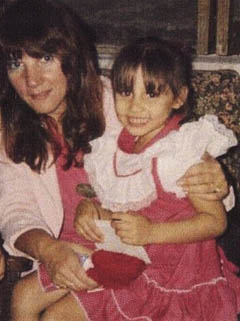I was about four years old when one day my father dressed me up in nice clothes and took me to my grandparents’ house. At my grandparents’ house, there was a beautiful woman who I didn’t know and when my brother saw her he ran to her and hugged her. My father told me that this woman was “my mother!”

Leila Elmergawi
My mother talked to me in words I did not understand, as I couldn’t speak English. She tried to hug me but I got scared, started crying, and ran away. My father tried to bring me back to the room and told me it was okay. He told me that I had to be polite and come back to spend some time with my mother, who had come all the way from the United States to see me (I was in Egypt then). Finally I went to spend time with her. Since I couldn’t understand what she was saying to me, the toys that she gave me were the only thing that made me smile. This was the last time I saw my mother for a long time.
Right after this, I started paying attention to conversations between my father and his family about “abduction,” “the kids’ mother,” “leaving the country,” “lawyers,” and “U.S. embassy officers.” I had no idea what all that meant. My father told me that he had abducted me from the United States, where my mother is from, and that he would not allow my mother to see me again because she was trying to take me away from him. We lived in a state of fear for a few months until one day we left the country.
We lived in three different countries, traveling from one place to another hiding from my mother and the American authorities. In the very beginning, I had feelings of anger and resentment towards “my mother” because I had to go through all this. I loved my father very much and didn’t want to be taken away from him. Later on, as I grew months and years older, these feelings of anger and resentment were mixed with feelings of abandonment and sadness. I wished I could see my mother. I was jealous of all my friends who lived with their mothers and I wished I knew mine. The only thing I knew about my mother then was her first name and a fading memory of the day I saw her, and I dared not ask about anything else.
I never knew what it was like to have a mother. Anytime I read children’s books, instead of wondering like other children what fairies looked like, I wondered how the characters in the books felt about having mothers. I always thought that having a mother must be the most wonderful thing in the world. At the same time, songs about mothers and Mother’s Day were my worst enemies. I refused to think that my father, whom I deeply loved, and still do, and who I knew loved me very much, would do anything to hurt me. I always thought that there must be a very good reason why he had abducted me from my mother. However, I always felt sad and incomplete, and I blamed it all on my mother.

Leila with her mother
I lived with these mixed feelings towards my mother until I was 13 years old, when I found out that my mother was able to get in touch with my brother and that he had been talking to her. I became very angry with him. I felt angry because I felt that he had betrayed my father and wasted all the years we had lived hiding in “exile,” which is how we felt at the time. I went to my brother’s room one day. He was talking to my mother on the phone and he said she wanted to talk to me. I reluctantly held the phone and heard her voice for first time. She said that she had been looking for me for years and that she was happy to finally know where I was. I could speak some English then and I understood what she said, but all I could do was cry and I could never say a word back.
I was torn for days and months after that. I wished it wasn’t up to me to make the decision whether to talk to my mother or not. I also felt I was betraying my father. If my father had known what was going on then and had asked me if I wanted to meet my mother, I would have said “no” to avoid hurting his feelings. It took a long time before I could even consider accepting my mother into my life and I felt that I couldn’t see her. She was just a stranger to me after all. Because of her patience and persistence, however, I finally agreed to see her. She came to Egypt and I sneaked out of my father’s house to see her for the first time in many years.
However, this story is not about me. I am a 26-year-old adult now. I have been in contact with my mother ever since I saw her in Egypt 12 years ago and I spent every summer with her when I was in college. Despite all the emotional distress I lived through as a child after I was taken away from my mother, and all the agony and suffering that I endured in silence, I am lucky! I now know my mother and she is a big part of my life as I always wished her to be. Nothing will bring back the years I lived without her in my life, but I don’t know what kind of person I would have been today without my mother.
This story, however, is about the hundreds of children in Japan who wake up every morning with the same feelings of agony that I felt growing up, deprived of having one of their parents in their lives. I was shocked to learn about this fact when I was in Japan doing an internship at the American Embassy in Tokyo last year. I also learned that Japan has actively engaged in talks to study the consequences of signing the Hague convention to prevent further cases of international parental child abduction to and from Japan.
However, it shattered my heart to learn that the hundreds of children who have been abducted to Japan in the past may not be returned to their homes or ever see their other parent again until they are adults. They will have to grow up with the agony I felt, suffering everyday and unable to do anything about it. My mom had been looking for me for years and we were both lucky she finally found me. Some of the left-behind parents that I met in Japan are close to losing hope of ever finding their abducted children. I wish I didn’t have to sneak out of my father’s house to see my mother when I was a teenager. I hope the system in Japan will have more options for these many children who were abducted to reunite with their parents and end their suffering without having to sneak out of their homes.
Leila Elmergawi was an intern at the Public Affairs Section at the U.S. Embassy in Tokyo in summer 2010. She attended Ain Shams University in Cairo, Egypt, for her B.A. degree in Japanese Studies, and Duke University in North Carolina for her M.A. degree in Liberal Studies and International Development Policy. Leila currently works at the Global Environment & Technology Foundation (GETF), a 501(c)(3) nonprofit organization based near Washington, D.C. with a mission to promote sustainable development around the world.







COMMENTS1
Speak only for yourself please. Many of us grew up quite happy and well cared for away from the United States and American parent. Many of us will never go back to the United States even for 1,000,000,000 USD because we’ve lost nothing of value there. The safety of growing up in a healthy and stable environment with competent adults more than made up for not having a mother. 20 years post “abduction” I still wouldn’t see my mother for all of the gold in Egypt.
LEAVE A COMMENT
TOP